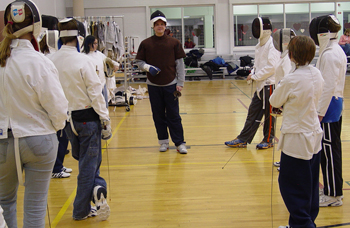 When James Askew was an undergraduate student at the University of Nebraska at Omaha in the early 1990s, he saw a flier on campus about a fencing club.
When James Askew was an undergraduate student at the University of Nebraska at Omaha in the early 1990s, he saw a flier on campus about a fencing club.
He went to a club meeting and has swung a foil ever since.
Askew now serves as a coach and president at the Omaha Fencing Club and he competes regularly — most recently at the Cornhusker State Games last month in Lincoln.
Below Askew — a research technologist in the Munroe-Meyer Institute — answers questions about his favorite sport.
What do you like about fencing?
What I enjoy most is the challenge that this sport continually offers me. To be able to outscore someone in a fencing match is succeeding in a contest of wills. I like a good challenge and enjoy winning a little bit, too.
 |
Munroe-Meyer Institute research technologist James Askew, center, works with students at the Omaha Fencing Club, where he serves as a coach. Askew has fenced since the early 1990s. (Photo provided courtesy of the Omaha Fencing Club) |
When I was 18, I fenced in the Junior Olympics, which was my first exposure to a national level tournament. The highest level I have competed at would be Division 1 foil at a Summer Nationals, which is the last tournament of the season and you must qualify to be able to attend. It is huge, imagine more than 6,000 fencers all competing in a number of events. It is truly a sight to behold.
How and/or where does one get fencing equipment?
There are no stores in the area that sell fencing equipment, so we mail-order for all ours. Some of the best equipment comes from Europe, as you can imagine given the long history of the sport in European countries.
|
You bet it can! The weapons we use are made of steel. Though they are flexible, you can get hit hard enough to get bruised, even through all the layers of thick cotton and kevlar. I had a large number of bruises after the Cornhusker State Games. This is why safety is paramount — we don’t fence unless we are following all the equipment guidelines set by our governing body, the United States Fencing Association.
What benefits would one get from taking up fencing? Is it good exercise? Does it teach lessons that are applicable to other parts of life?
First of all, fencing is a great way to keep active and in good physical condition. A bout can be demanding on the body with the constant movement required to keep distance from your opponent, the need to instantly react to a situation, the long lunges that are used for attacks and the endurance required to stay with an opponent through a whole match. Also, fencing keeps one mentally sharp. Some have said that a fencing match is like a chess match on your feet. Watching, influencing and reacting to your opponent requires a competitor to be mentally sharp, and by practicing you can train yourself to be able to handle yourself against any opponent. There is a certain amount of pride that comes from that and the feeling of accomplishment when winning a tournament after a whole day of competition is very fulfilling.
What do you find most rewarding about fencing?
I would have to say taking home a medal, most any medal, is very rewarding. It’s like a certificate telling me my hard work has paid off and that I am having a good day.
Training, training and training.
So, saber is the most difficult weapon to master in fencing, isn't it?
BTW, foil and epee is cool, I think.